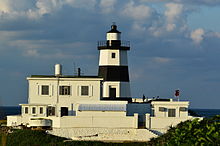Fuguijiao Lighthouse

 | |
 | |
| Location | Laomei Village Shimen District New Taipei City Taiwan |
|---|---|
| Coordinates | 25°17′55″N 121°32′12″E / 25.298536°N 121.536665°E |
| Tower | |
| Constructed | 1949 |
| Construction | reinforced concrete tower |
| Height | 14.3 m (47 ft)[1] |
| Shape | octagonal tower with balcony and lantern on a one-story keeper’s house[2] |
| Markings | white and black-band tower,[2] white lantern, black lantern dome |
| Operator | Maritime and Port Bureau[1] |
| Fog signal | one 3s. blast every 30s.[2][1] |
| Light | |
| First lit | 1962 |
| Focal height | 31.4 m (103 ft)[1] |
| Range | 26.8 nmi (49.6 km; 30.8 mi)[1] |
| Characteristic | Fl (2) W 15s.[2][1] |
| Fuguijiao Lighthouse | |||||||||||||
|---|---|---|---|---|---|---|---|---|---|---|---|---|---|
| Chinese name | |||||||||||||
| Traditional Chinese | 富貴角燈塔 | ||||||||||||
| Simplified Chinese | 富贵角灯塔 | ||||||||||||
| Postal | Fukwei Chiao Lighthouse | ||||||||||||
| |||||||||||||
| Japanese name | |||||||||||||
| Kanji | 富貴角灯台 | ||||||||||||
| Hiragana | ふうきかくとうだい | ||||||||||||
| |||||||||||||
The Fuguijiao or Cape Fugui Lighthouse is a lighthouse on Cape Fugui near Laomei Village (老梅里, Lǎoméi Lǐ) in Shimen District, New Taipei City, Taiwan.
Name
[edit]The lighthouse is named after nearby Cape Fugui, the northernmost point of Taiwan. Its Japanese name was Fūki Kaku. Its Chinese name (derived from a Hokkien transcription of the Dutch word hoek, meaning "hook" or "cape")[3] is also romanized Cape Fukwei[2] for the Chinese Postal Map, Fu-kuei Chiao using simplified Wade-Giles,[2] and Fugueijiao from Tongyong Pinyin. It was also sometimes known in English as the Hoek Lighthouse.[4]
History
[edit]A structure was first erected on the rocks at Cape Fugui in 1896[5][6] or 1897[1][7] by the occupying Japanese. It was a terminus for undersea cables[8] from the Japanese islands and its construction materials all came from there.[7] It was ruined during World War II but its remains were used by China's Nationalist government for the erection of a 30 m (98 ft)[6] octagonal iron lighthouse[1] in 1949.[5] The foghorn was particularly needful, owing to poor visibility in the area during the fall and winter months.[1]
The lighthouse's current 14.3 m (47 ft) concrete black-and-white octagonal tower was raised in 1962.[1][8] The height was greatly reduced to improve the reception of the nearby air force radar station.[6]
Taiwan's Customs traditionally welcomed visitors to the lighthouse once a year on Tax Day as an open house gesture.[4] After the enthusiastic public response to opening Eluanbi Lighthouse to more general tourism, Taiwan's Maritime and Port Bureau decided to open Fuguijiao to regular visitors in 2015.[9] The first tourists were allowed onto the grounds on September 5, making it the 11th Taiwanese lighthouse opened to the general public.[6] It remains inaccessible on weekdays because of the radar station.[5] The tower itself remains closed to the public.[2]
Transportation
[edit]The lighthouse is located about 2 km (1.2 mi) north of Laomei Village,[2] off Provincial Highway 2.
See also
[edit]References
[edit]Citations
[edit]- ^ a b c d e f g h i j MPB (2016), "Fukwei Chiao Lighthouse".
- ^ a b c d e f g h Rowlett, Russ. "Lighthouses of Taiwan: Northern". The Lighthouse Directory. University of North Carolina at Chapel Hill.
- ^ Caltonhill, Mark (4 May 2012), "富貴角 Fuguei Cape, New Taipei City", From Takow to Kaohsiung, Blogspot.
- ^ a b "12 Lighthouses in Taiwan to Open to Public on June 30", Want China Times, 7 June 2012, archived from the original on 27 February 2012, retrieved 19 February 2015.
- ^ a b c NTC (2019), "Fugui Cape".
- ^ a b c d MPB (2016), "Maritime and Port Bureau Facilitates the Fugueijiao Lighthouse".
- ^ a b NTC (2019), "Fugui Cape Lighthouse".
- ^ a b "Taiwan's Century-Old Fugueijiao Lighthouse Opened to Public", Want China Times, 31 August 2015, archived from the original on 27 February 2012, retrieved 19 February 2015.
- ^ Wang Shu-fen; et al. (21 February 2015), "Taiwan to Open Two More Lighthouses to Visitors", Focus Taiwan.
Bibliography
[edit]- Official site, Taipei: Maritime and Port Bureau of the Ministry of Transportation and Communication, 2016.
- Official site, New Taipei City: Tourism and Travel Department, 2019.
